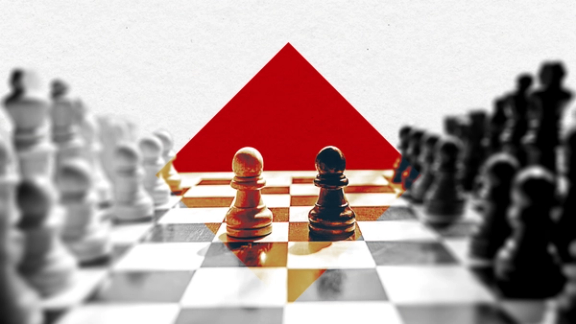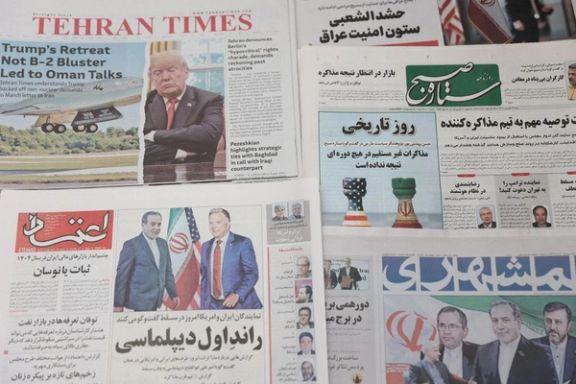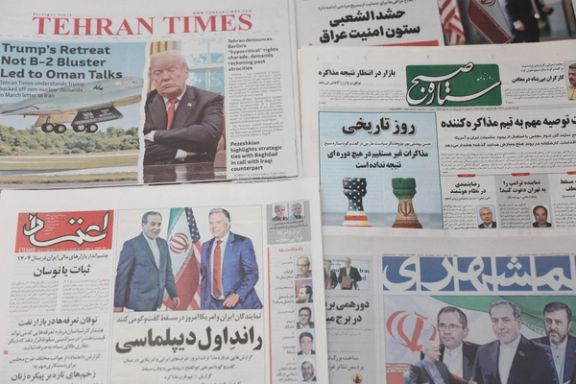Iran’s deployment of advanced enrichment machines adds complexity to ongoing nuclear talks.
Read how this escalation is altering negotiation dynamics and testing the resolve of international stakeholders here.

Iran’s deployment of advanced enrichment machines adds complexity to ongoing nuclear talks.
Read how this escalation is altering negotiation dynamics and testing the resolve of international stakeholders here.


Diplomatic sources told Iran International this week that President Donald Trump’s envoy, Steve Witkoff, “welcomed a three-stage proposal presented by the Iranian side” during the first round of negotiations in Oman on April 12.
The report published on Thursday said that Iran offered to temporarily reduce the level of its uranium enrichment in exchange for significant sanctions relief, including permission to export oil, as the first phase of an agreement with the United States. Later phases would involve Tehran making a “permanent” pledge not to enrich uranium beyond the 3.67% limit set by the Obama-era JCPOA. The arrangement would also include Iran shipping out highly enriched uranium to a third country in exchange for further sanctions relief, including the lifting of longstanding US sanctions.
The sources told Iran International that Witkoff’s positive response to the Iranian proposal surprised their delegation in Muscat.
What the diplomats did not clarify is the fate of roughly 17,000 uranium enrichment machines, known as centrifuges—arguably the most critical component of Iran’s current nuclear program. These are the machines capable of refining uranium to weapons-grade levels of 90%.
Under the JCPOA agreement, Iran was allowed to keep 5,000 machines in operation for ten years, with roughly 7,500 centrifuges kept in storage. That limitation that Tehran has already violated would end in 2025.
Since the US withdrew from the JCPOA, Iran has significantly increased its number of centrifuges in operation and deployed more advanced models with higher output. If Tehran is allowed to retain a substantial portion of this infrastructure, it could resume higher-level enrichment at any time.
The Arms Control Association said in 2022 that, “Several of Iran’s escalatory breaches have resulted in its acquisition of new knowledge and expertise that cannot be reversed.”
The Islamic Republic urgently needs sanctions relief, as its economy is in deep crisis and the national currency has lost nearly half its value since September. If the United States lifts some sanctions and unfreezes assets in exchange for only a temporary reduction in enrichment, Tehran will feel less pressure to move quickly toward further phases of the proposed agreement.
This could allow Iran to stall for time—as it did during the Biden administration—until President Trump nears the end of his term and the 2028 election campaign begins. This may explain why Tehran, according to the report, has prioritized the lifting of oil export sanctions in the first phase.
Iran has consistently insisted that the US must “show good faith” in any negotiation. This has typically meant lifting at least some of the sanctions reimposed by President Trump in 2018. Tehran has also called for an end to US “pressure,” a demand that could reduce Washington’s leverage in protracted talks if sanctions are eased too early.
Iran began enriching uranium to 60 percent in 2021 following a December 2020 parliament decision to retaliate against the US. Interestingly, for more than two years Iran waited during the first Trump term before taking any drastic retaliatory step and only upped the ante after President Joe Biden’s election. Until then, enrichment levels had remained below 5 percent.
If Iran retains its centrifuge infrastructure, it remains capable of resuming high-level enrichment—as it has done since 2021. One of the core criticisms of the JCPOA is that it never fully banned enrichment, and many of its key restrictions are now approaching expiration.
On the diplomatic and economic fronts, a partial or phased agreement would allow Iran to build closer ties with countries such as India, and trade more freely with China and Europe. That would reduce the urgency currently driving Iran’s negotiations—and could complicate US efforts to pursue a phased deal in a meaningful way.
Iranian media offer conflicting accounts of the country’s talks with the US, reflecting a fractured narrative and growing confusion.
Read the analysis here.

The divide among Iran's ultraconservatives began at least a month before the latest round of Iran-US talks, but it has since escalated into an open rift, with most hardliners now backing away from their earlier opposition to negotiations.
Explore the full story behind Iran's conservative divide here.
Recent comments by US envoy Steve Witkoff suggest that Washington's goals in the ongoing talks with Iran go somewhat beyond those of the 2015 nuclear deal negotiated under President Barack Obama—but without representing a radical departure.
Unpack the full analysis here.

US envoy Steve Witkoff, who on Monday appeared to signal that Washington might tolerate limited uranium enrichment by Iran, clarified in a Tuesday tweet that Tehran "must stop and eliminate its nuclear enrichment and weaponization program."
Witkoff’s remarks on Monday suggested that any new deal could closely resemble the Obama-era JCPOA, which President Donald Trump withdrew from in 2018.
In a tweet on Tuesday Witkoff seemed to have backtracked from his earlier statement.
“A deal with Iran will only be completed if it is a Trump deal," the special envoy said and added, "...meaning that Iran must stop and eliminate its nuclear enrichment and weaponization program."
On Monday, Witkoff had said in an interview with Fox News’ Hannity that Iran's uranium enrichment would not be eliminated entirely but rather scaled back to the JCPOA’s limit of 3.67 percent. “They do not need to enrich past 3.67 percent,” he said.
Ha also added that “This is going to be much about verification on the enrichment program, and then ultimately verification on weaponization. That includes missiles—the type of missiles that they have stockpiled there—and it includes the trigger for a bomb.”
This particular demand would be within reach, as Tehran has repeatedly has called for a US return to the original terms of the JCPOA.
So what was new in Witkoff’s remarks in his interview with Fox?
First, the Trump administration is seeking a broader inspection regime than the one included in the JCPOA. This could entail access not only to declared enrichment facilities, but also to potential sites involved in warhead development. Iran has consistently resisted such expanded oversight, and this will likely be a point of friction in the talks.
Second, Witkoff explicitly mentioned Iran’s ballistic missile program—a domain left mostly untouched by the original nuclear deal. Including missile oversight would require access to Iran’s extensive military research and development infrastructure, which Tehran has long refused to open to outside inspection.
The logic for including missiles is clear. If Iran were to produce nuclear warheads, ballistic missiles would be its most viable delivery system. Iran has already built thousands of such missiles. While they may not be highly advanced, when armed with nuclear warheads, they could pose a significant threat to the region, including Israel, Greece, and potentially other parts of southern and eastern Europe.
Witkoff had hinted at the administration’s limited goals in an earlier interview with Tucker Carlson in March. However, other senior officials, including the Secretary of State and the National Security Adviser, have publicly pushed for the complete dismantling of Iran’s nuclear program.
One unresolved issue is also the fate of nearly 300 kilograms of highly enriched uranium that Iran has stockpiled. According to a report by The Guardian on Tuesday, the United States has proposed transferring the material to a third country, such as Russia—a move Tehran is likely to oppose. The issue was reportedly raised during recent talks in Oman between Foreign Minister Abbas Araghchi and Witkoff, but Iran insisted the stockpile remain under UN supervision inside the country..
Ultimately, the central question is how quickly and how far Tehran is prepared to go in reaching a deal, specially if the US insists on zero enrichment—and whether the Trump administration is willing to compromise on its tougher demands during the bargaining process.
"Iran has to get rid of the concept of a nuclear weapon. They cannot have a nuclear weapon," President Trump said on April 14. "I think they're tapping us along because they were so used to dealing with stupid people in this country."
“They've got to go fast, because they're fairly close to having one, and they're not going to have one,” he added. “If we have to do something very harsh, we'll do it. And I'm not doing it for us, I'm doing it for the world. These are radicalized people, and they cannot have a nuclear weapon.”